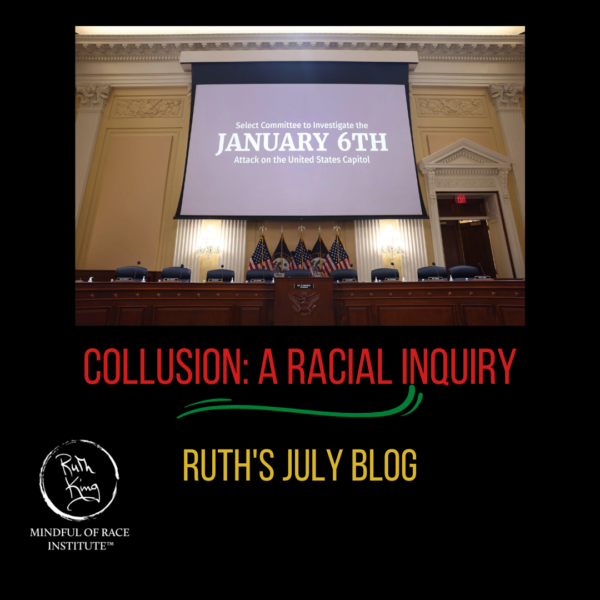Attention Influencers
Much has been revealed from the House’s Committee hearings investigating Donald Trump and Trump loyalists’ involvement in efforts to overturn the 2020 election and January 6 insurgence at the Capital. Much of it is revolting, enraging, and heartbreaking. And then there are those times of confusion from not being sure you fully understand what is happening and times of despair from being painfully clear that you do!
I can imagine the emotional weight and wit involved in the Committee’s effort to sort through a convoluted chronology that is slowly and painstakingly revealing what happened, all in an intense atmosphere of what feels like a regression of democracy, inclusive of voting suppression, racism, war on the poor, white male supremacy, religious hegemony, the overturn of Roe v. Wade, environmental exploitation, mass gun violence and domestic terrorism, and variants of COVID, to name a few. As Influencers, we also hold a tremendous weight discerning complex dynamics in entrenched and often unconscious systems in service to diversity, equity, and inclusion initiatives. Thus, in many ways, the Jan. 6 Hearings mirror similar challenges.
While the Hearings can be hard to watch and to track, the job of the Committee is to investigate what happened so that justice is [hopefully] served, and history doesn’t repeat itself. Herein, too, lies our work as influencers. For example, as I witness the Hearings, I notice collusive complexities intersecting morality, white supremacy, and self-interest, and how our existing governing structures uphold these concerns. What do you see?
At this tumultuous time, we have an opportunity to both understand what is happening politically and examine for ourselves our relationship and its impact on how we serve.
Our Inquiry
A few questions come to mind for our inquiry: (1) How are the Jan. 6 Hearings impacting your work in diversity, equity, and inclusion? (2) What are the hearings’ revealing that resemble the power and structural challenges you face in your work as an influencer? (3) How is what’s happening politically affecting why you serve and how you serve organizations?
The aim of this inquiry is not agreement or having the absolute answer, not that one exists. Rather, I’d like to offer a few thoughts intended to support critical thinking and land you in the heart of your own morality while strengthening your understanding and influence. Consider the following inquiry as you witness the unfolding of the January 6 Committee and testimony, and your work within organizations.
Collusion
In my book, Mindful of Race: Transforming Racism from the Inside Out, I discuss Collusion as a strategy that maintains white privilege and ultimately white supremacy. Collusion involves acts driven by our conscious or unconscious desire to gain or maintain racial group membership and status. We collude to gain favor or approval; to play it safe, fit in, or avoid being a target of attention or harm. Collusion is one of many forces that keep white supremacy intact.
White Supremacy
White supremacy is white people having dominant racial group power over the welfare of other races through governing structures of influence. It includes the inherent and normative belief that white people are superior to other races. When we look at the dominant race within the US Senate, for example, we see white people, specifically white Republican men. This is not new – white men have historically held such stations with presumed superiority.
White supremacy shapes a political and organizational culture in which whoever is operating within this culture must play by certain rules. Power norms within this culture dictates who’s in and who’s out and what’s appropriate and what’s not. It further determines the degree to which someone can play the game, challenge the game, or be tossed out of the game. One could say, for example, that the Jan. 6 insurrection, and all that led to it, was a way of demanding that the structural philosophy of white supremacy is maintained, by any means necessary.
Collusion & White Supremacy
Collusion has been on bold display in the days, weeks, and months prior to and following the insurrection and Hearings. We could say that another word for collusion is self-interest. For example, If I’m a white man and I believe (consciously, historically, or unconsciously) that white men should be in charge, and – by the way – they are, and I want to maintain my status in whiteness and power, I am going to do whatever I can to preserve my membership (regardless of my race or gender).
As I listen to those who have testified as well as the rationale for refusing to testify, I can see various combinations of the following views:
- I’m fine with Trump because I believe in what he stands for.
- I’m fine with Trump because he serves my self-interest.
- I’m fine with Trump but I’m not breaking the law.
- I’m no longer fine with Trump and I’m not breaking the law.
- I’m no longer fine with Trump but now I must protect my interests.
- I take the 5th!
What collusive dynamics do you see as you watch the Hearings?
What collusive dynamics can you glean from the Hearings that are reflected in organizations you serve?
What collusive dynamics would you add to this list?
Gratification – Danger – Escape
In the mindfulness traditions, a tripod is often represented that speaks of gratification, danger, and escape. To dramatically simplify this framework (and adapt it for this inquiry), gratification has to do with our drive to get more of what we want (greed). Danger has to do with how far we are willing to go to make sure what we don’t want doesn’t happen (aversion and ill will). And escape is what we are willing to disregard or ignore in our preferential pursuits (delusion).
As the Hearings’ testimony unfolds, you can perhaps discern the nuanced ways gratification, danger, and escape is on display. When whites in power collude, they are betting that their choice to behave a certain way will get them more of what they want, keep what they don’t want at bay, and if necessary reinterpreted or ignore the impact of its actions on others and the law.
As you weigh the January 6 testimony, how might this tripod apply?
How does this tripod impact diversity, equity, and inclusion advancement?
Your Insight, Your Choice
We all have ways of interpreting the information we are receiving from the Jan. 6 hearings. In this blog, I’m not trying to be right; I’m trying to be critical, and to invite us to see for ourselves how the Hearings are revealing structural and cultural ways we have been conditioned to relate to racial power and influence. We often talk of democracy as if it has always been the truth of our country, but for the majority of us, it has never been the truth – it is an aspiration that we must continue to fight for, and the Jan. 6 Committee is concerned with just that!
As influencers, the Jan. 6 Hearings offer us the glaring opportunity to see deeply embedded systems of complicity, duplicity, and hegemony in our political process. Seeing these structures and how they are integral to political life supports us in recognizing and understanding some of the roadblocks we encounter in diversity, equity, and inclusion efforts and how we might respond with a more analytical mind, not just an emotional heart.
Frustration is understandably high! I often hear comments like I’m so tired of hearing this Jan. 6 story again and again. I’m exhausted thinking about it. I just can’t watch the news anymore. I’m ready to leave this country. Or our aversion is expressed in body language, in the way we bring lifelessness to the conversation, or by avoiding it altogether. Believe me – I can relate!
Like it or not, as DEI influencers, we can watch the Jan. 6 Hearings and grow our recognition of how harmful political norms governing our lives are alive in our organizational work and do our part to bring them to light. The three questions posed earlier are not meant to be answered once or answered quickly. Rather, they serve as repeat questions that keep us aware of the broader context in which we operate and the values influencing our choices.
What values govern your DEI work? What if, for example, the fundamental values of our work were: (1) No one is harmed or exploited; (2) Everyone is valued, able to afford basic needs and strive, and; (3) An understanding and deep respect that every thing we do impacts the greater whole. It’s here, in this mindful of race inquiry, that I return time and again. It calls all of us – Indigenous folks, Black folks, White folks, all folks – to practice seeing reality through the lens of collective wellbeing and care. Having a conscious, analytical framework to rigorously examine our habits of mind can refine morality, reduce emotionality and impulsivity, increase discernment, and inform wise action – actions that support all of us, not just some of us. This, we can do!
I will close with this inspirational quote from James Baldwin:
A country is only as strong as the people who make it up, and the country turns into what people want it to become. We made the world we’re living in, and we have to make it over.
For more information on how to wake up together in racial affinity, visit my course on Brave Space.

